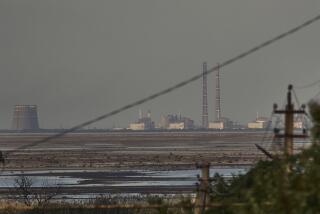3 Reactors at Chernobyl Will Reportedly Resume Operations
- Share via
MOSCOW — Izvestia quoted a member of the Soviet government investigating commission Tuesday as saying the three remaining nuclear reactors at Chernobyl are being prepared to resume operation. He did not say when they would restart.
The government newspaper also said radioactive waste from the April 26 disaster at the Ukrainian power plant will be buried where a new reactor was to have been built.
It said radiation remained very high in parts of the plant but quoted an official overseeing the cleanup as saying that the temperature of the destroyed reactor had declined to about 390 degrees Fahrenheit.
The last report on the reactor temperature, given Saturday by Deputy Premier Ivan S. Silayev, put it in the range of 390 to 480 degrees.
‘Enemy Radio Voices’
Another newspaper, Soviet Russia, acknowledged that many residents of Kiev, 60 miles south of Chernobyl, tried to flee the city of 2.4 million after the reactor explosion and fire. It blamed their fear on “enemy radio voices” from the West but did not elaborate.
The Soviet Union did not acknowledge the accident until 68 hours after it occurred, when high levels of radiation had been reported in Scandinavia and Sweden demanded an explanation. The government gave little information initially.
According to Izvestia, Silayev’s place on the government commission investigating the accident and supervising the cleanup has been taken by Lev A. Voronin, another deputy premier who heads the state supply committee.
No explanation was given for the change.
Operations Program
The paper quoted Voronin as saying the cleanup team has an operations program extending at least to June 15 and is getting the other three reactors ready for a restart.
Izvestia opened its report by saying that no one could go near the No. 4 reactor and the ruined building that housed it because of the high radiation.
It said a 19-ton bulldozer flown in from Chelyabinsk, an industrial city in the Ural Mountains, was helping build a heap of radioactive waste that would be buried where the plant’s fifth reactor was to have been constructed.
More to Read
Sign up for Essential California
The most important California stories and recommendations in your inbox every morning.
You may occasionally receive promotional content from the Los Angeles Times.













